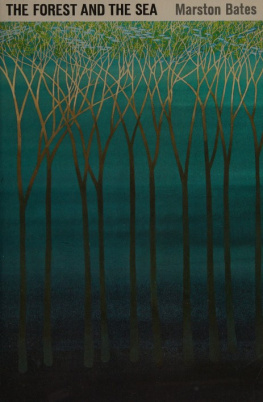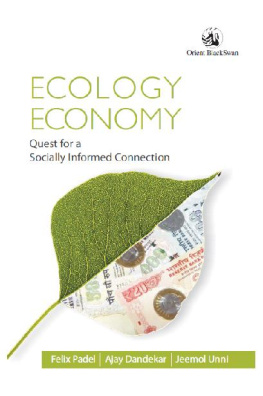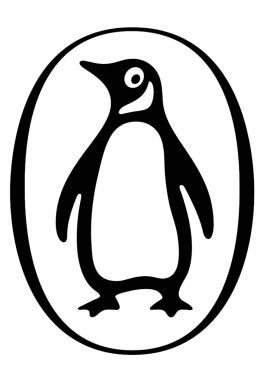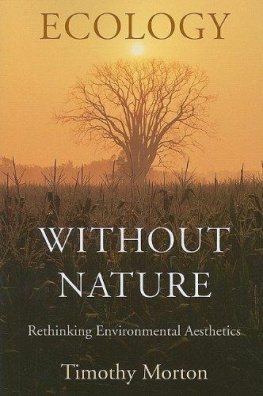Marston Bates - The Forest and the Sea: A Look at the Economy of Nature and the Ecology of Man
Here you can read online Marston Bates - The Forest and the Sea: A Look at the Economy of Nature and the Ecology of Man full text of the book (entire story) in english for free. Download pdf and epub, get meaning, cover and reviews about this ebook. year: 1980, publisher: Time-Life Books, genre: Religion. Description of the work, (preface) as well as reviews are available. Best literature library LitArk.com created for fans of good reading and offers a wide selection of genres:
Romance novel
Science fiction
Adventure
Detective
Science
History
Home and family
Prose
Art
Politics
Computer
Non-fiction
Religion
Business
Children
Humor
Choose a favorite category and find really read worthwhile books. Enjoy immersion in the world of imagination, feel the emotions of the characters or learn something new for yourself, make an fascinating discovery.
- Book:The Forest and the Sea: A Look at the Economy of Nature and the Ecology of Man
- Author:
- Publisher:Time-Life Books
- Genre:
- Year:1980
- Rating:3 / 5
- Favourites:Add to favourites
- Your mark:
- 60
- 1
- 2
- 3
- 4
- 5
The Forest and the Sea: A Look at the Economy of Nature and the Ecology of Man: summary, description and annotation
We offer to read an annotation, description, summary or preface (depends on what the author of the book "The Forest and the Sea: A Look at the Economy of Nature and the Ecology of Man" wrote himself). If you haven't found the necessary information about the book — write in the comments, we will try to find it.
Marston Bates: author's other books
Who wrote The Forest and the Sea: A Look at the Economy of Nature and the Ecology of Man? Find out the surname, the name of the author of the book and a list of all author's works by series.
The Forest and the Sea: A Look at the Economy of Nature and the Ecology of Man — read online for free the complete book (whole text) full work
Below is the text of the book, divided by pages. System saving the place of the last page read, allows you to conveniently read the book "The Forest and the Sea: A Look at the Economy of Nature and the Ecology of Man" online for free, without having to search again every time where you left off. Put a bookmark, and you can go to the page where you finished reading at any time.
Font size:
Interval:
Bookmark:


Time-Life Books Inc.
is a wholly owned subsidiary of
TIME INCORPORATED
Time Reading Program: Editor. Max Gissen
Copyright, I960, by Marston Bates.
Reprinted 1980 by arrangement with Random House Inc.
Editors Preface, Time Reading Program Introduction
and cover design (paperback edition) 1964 by Time-Life Books Inc.
All rights reserved.
Printed in the United States of America.
Time-Life is a trademark of Time Incorporated U.S.A.
Library of Congress CIP data, page 273.
For information about any Time-Life book, please write:
Reader Information, Time-Life Books,
541 North Fairbanks Court, Chicago, Illinois 60611.
This book is dedicated to the students of Zoology 235 at the University of Michigan. They have contributed greatly to my education; have given me continuing friendships; and have provided an assurance that, as far as the next generation is concerned, the future is in good hands.
One day in the 1940s, as a biologist named Marston Bates worked at the top of a ladder that reached some 80 feet into the arboreal canopy of the South American rain forest, a surprising thought flashed through his mind. Although his treetop post was fairly hot and several hundred miles inland, Bates found himself thinking of the sea. This vision was brought on not by a longing for a cooler place but by a fresh scientific notiona suddenly sharpened awareness of the parallel behavior of marine and woodland creatures. More than a decade after that moment of insight, Batess idea developed into The Forest and the Sea, a deceptively entertaining book which may someday alter mans view of the world around him.
Across the pages of this book march endless parades of strange and wonderful creatures: mosquitoes that rise and sink in the depths of the forest like plankton in the sea; fish that travel over land; barracuda that lurk in the black waters of night; army ants more devastatingly fierce than any other imaginable predator. A honeybee sees things in invisible ultraviolet light, and a monkey fresh from its native habitat learns to steal spectacles from strangers noses and make an omelet on the ceiling. But The Forest and the Sea is far more than merely a kaleidoscopic adventure or a clever comparison of fowldom with fishdom: it is a mature and creative expression of humanitys place in nature.
At the time Bates entertained the germinal idea which led to the title of this book, he was well on his way to becoming one of historys most knowledgeable experts on the distinctive manners and morals of one of the worlds most unlovable inhabitants, the mosquito. Indeed, he was in the treetops when the idea struck him because he was investigating a high-flying species of this insect. He had earlier spent five years studying malarial mosquitoes in Albania and Egypt, and was now in the midst of an eight-year stay in a remote spot of Colombia to investigate the role of the pest in jungle yellow fever. The consequence, in 1949, was Batess first book, The Natural History of Mosquitoes, a thoroughgoing scientific exploration of mosquito behavior. It was immediately acclaimed as a fundamental contribution to science. Among other things, it dramatized by implication how mans hopes of controlling his environment could be dashed if he ignored the actual relationships between different species. (For example, Bates demonstrated why the Rockefeller Foundations early hope of eradicating jungle yellow fever simply by suppressing it in population centers was a forlorn dream: in the treetops, in the absence of man, certain mosquitoes kept the virus alive by spreading it among monkeys.)
Addressed to other scientists, that first volume merely hinted at the importance of mans involvement in the behavior of animals and the realities of nature. The Forest and the Sea, spawned in the same mosquito-laden current and destined for missionary duty in the same cause of natural history, is quite different. In one sinuous flash through the literary stream it offers substance for the seeker of exotic curiosities, a lesson for the molecular biologist, philosophy for the intellectual and the wisdom of an old-fashioned naturalist for the lover of literature. The book examines the plant and animal worlds, their relationship to one another, and mans relationship to both of them.
Perhaps the broad canvas Bates employs to depict his planetary view of nature is a direct product of his lifelong dual interest in science and writing. He published his first scholarly article, A Geometrid Larva on Grapefruit, while in high school, then as a college undergraduate tried vainly to place all manner of poetry, stories and articles with popular magazines. He has now produced nine books, including the tome on mosquitoes and The Forest and the Sea. He also headed a group of scientists who produced a new high school biology text (which instead of beginning with the traditionaland dullbody cell, starts out with a familiar scene from nature, a rabbit sitting beneath a raspberry bush). Altogether, more than 100,000 copies of his books have been sold, and most of the titles are still in print. The Forest and the Sea, originally published in 1960, has been translated into Japanese, Portuguese, Spanish, Arabic, Polish and French.
Bates has scant patience with scientists who complain that laymen do not understand them. The root of their problem, he suggests, is an uncontrollable habit of spewing out an inky cloud of Greek terms behind which any meaning can hide like an imaginary octopus. Science remains a rather mysterious affair, he has remarked in The Nature of Natural History, cultivated by special priesthood, guarded by an unintelligible jargon. In The Forest and the Sea he expands the point.
We are liable to fool ourselves into thinking we have produced a new thought, when we have only produced a new word . Biocenosis leads easily to biomes and biochores, to ecosystems, ecotones and seres. These are all lovely words, but they dont really say anything new. The trouble is that the word-coiner, sinking blissfully into his addiction, gradually loses all communication with the outer world.
Bates is equally concerned about the fragmentation of knowledge. Biologists today are sharply split into two camps: the smaller number of them, including Bates, concentrate on the relationships among organisms or, to give the subject its learned name, ecology; the rest have given up such time-honored pursuits in favor of a heady quest for truths at the level of the molecule. To most molecular biologists a mosquito is primarily something to be repelled by a chemical on the skin. To the ecologist, a mosquito is, among other things, an influence on the world he lives in and on its other inhabitantsincluding mankind. As Bates says in this book:
Man has not escaped from the biosphere. He has got into a new, unprecedented kind of relationship with the biosphere; and his success in maintaining this may well depend not only on his understanding of himself, but on his understanding of this world in which he lives. It looks as though, as a part of nature, we have become a disease of natureperhaps a fatal disease. I am not advocating a return to the neolithic. But long run efficiency would seem to require certain compromises with nature.
As anthropologist Loren Eiseley points out in his eloquent new introduction to this special edition, Bates has seen the implications of humanitys relationship to nature with a clarity that even Darwin failed to achieve. Marston Bates has literally put man in his place in a way nobody before him has done, says virologist Telford H. Work of the U.S. Public Health Service Communicable Disease Center. He has put together what biologists know in a way that every intelligent person in the world can understand. You simply cannot assess the effect this has had on key people in many walks of life.
Next pageFont size:
Interval:
Bookmark:
Similar books «The Forest and the Sea: A Look at the Economy of Nature and the Ecology of Man»
Look at similar books to The Forest and the Sea: A Look at the Economy of Nature and the Ecology of Man. We have selected literature similar in name and meaning in the hope of providing readers with more options to find new, interesting, not yet read works.
Discussion, reviews of the book The Forest and the Sea: A Look at the Economy of Nature and the Ecology of Man and just readers' own opinions. Leave your comments, write what you think about the work, its meaning or the main characters. Specify what exactly you liked and what you didn't like, and why you think so.












